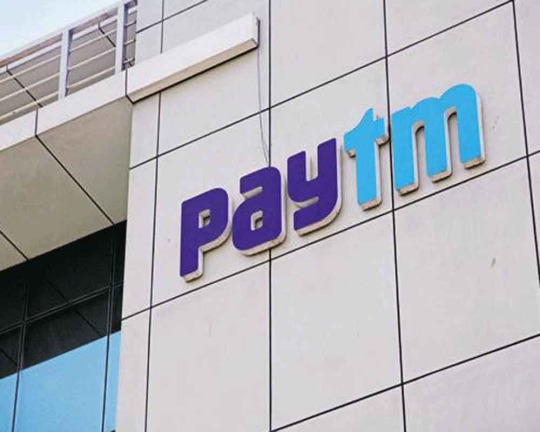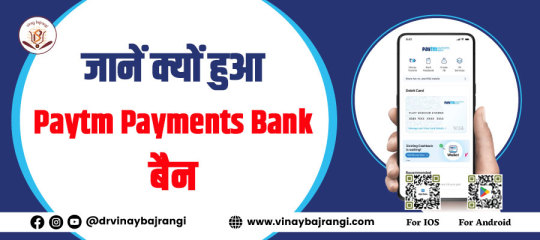#Paytm Payment Bank
Text
Unraveling the Paytm Crisis: Implications for India's Finance and Fintech Sector
The recent imposition of limitations on Paytm Payments Bank by the Reserve Bank of India (RBI) has sent shockwaves through the fintech sector, prompting reflections on its potential impact. This crisis underscores the importance for all fintech players to prioritize regulatory adherence, with potential outcomes and lessons for finance professionals and industry participants.
Key…

View On WordPress
#Fintech Sector#Indian Economy#Paytm#Paytm Crisis#Paytm Implications#Paytm news#Paytm Payment Bank#Paytm Wallet
0 notes
Text
Macquarie warns investors about the serious implications of Paytm shares after RBI ban
In the aftermath of the Reserve Bank of India's (RBI) actions against Paytm Payments Bank Ltd. (PBPL), Macquarie, a leading global research firm, analyzes the potential impact on Paytm's vast customer base and its business operations. The RBI's restrictions on Paytm shares have raised concerns about the company's lending business, technical analysis of its shares, and the strategic importance of PBPL. This article provides key takeaways from the analysis and expert opinions on Paytm's situation.
Key Takeaways
RBI's restrictions on Paytm shares have raised concerns about the company's lending business, technical analysis of its shares, and the strategic importance of PBPL.
The impact on Paytm's lending business is expected to be significant, as it generates around one-fifth of its revenue from this segment.
Paytm's share price faces crucial support at ₹700 and ₹590 apiece levels, with a hurdle at ₹810 and ₹890 apiece levels.
The restrictions on PBPL significantly hamper Paytm's ability to retain customers and sell payment and loan products, leading to potential revenue and profitability implications.
Macquarie has a 'neutral' rating on Paytm stock with a target price of ₹650 apiece, indicating cautious outlook and potential downside.
RBI's Restrictions on Paytm Shares

Impact on Lending Business
The recent RBI restrictions have sent a shockwave through Paytm's lending business, which is a critical revenue stream, accounting for over 20% of the company's revenues. Lending partners may reassess their involvement with Paytm due to heightened operational and governance risks, potentially leading to a significant downturn in business collaboration.
Paytm's ecosystem is vast, with over 330 million wallet accounts and a monthly transacting user base of 100 million. The RBI's ban on new customer onboarding could force Paytm to double down on its existing customer base to maintain its lending operations. However, this comes with its own set of challenges, as customer retention could be at risk due to the inability to offer new payment and loan products effectively.
The implications of the RBI's ban are far-reaching, affecting not just the lending business but also wallet GMV, merchant services, and Fastag GMV. This multi-faceted impact could be a key risk to earnings and valuations, and all eyes are on Paytm's management for their next move.
Technical Analysis of Paytm Shares
Following the RBI's clampdown, Paytm's stock has been on a rollercoaster. Technical analysts are eyeing key support and resistance levels to gauge the stock's next moves. The support levels are pegged at
u20AC700 and
u20AC590, which are critical for the stock to hold to avoid further downside. On the flip side, resistance is forming at
u20AC810 and
u20AC890, levels that the stock must breach to signal any potential recovery.
In light of recent events, investors are advised to closely monitor these technical thresholds as they could dictate the short-term trajectory of Paytm shares.
Here's a quick look at the recent stock performance:
| Date | Closing Price (
u20AC) | Intraday Low (
u20AC) |
|------------|-----------------|----------------|
| 01 Feb 2024| 761 | 608.8 |
Also read :Unlocking the Future: Exploring AI Applications in Finance and Its Impact on the Industry
The stock's plunge to 608.8 from its previous close indicates a significant bearish sentiment among investors. This level is just above the crucial support, hinting at a precarious balance for Paytm's valuation in the market.
Strategic Importance of PBPL
The Paytm Payments Bank Ltd. (PBPL) isn't just another cog in the wheel; it's the engine driving Paytm's expansive financial universe. With a staggering over 330 million wallet accounts, PBPL is a behemoth in Paytm's ecosystem, integral to the company's operations and growth. The bank's services are diverse, ranging from credit and deposits to UPI transactions and FASTag toll payments, where it boasts a significant 17% market share.
The recent RBI restrictions have thrown a spanner in the works, potentially disrupting customer retention and the sale of payment and loan products. This could spell trouble for Paytm's revenue and profitability in the long run. Here's a quick rundown of PBPL's offerings:
Credit and deposit services
Fund transfers
UPI transactions
FASTag toll payments
Bill payments
Wallet usage
The strategic role of PBPL cannot be overstated. Its ability to facilitate a wide array of financial services makes it a cornerstone of Paytm's business model. The current predicament, however, puts its pivotal role at risk, with Macquarie highlighting the challenges ahead.
RBI's Directives to Paytm Payments Bank Ltd.

Halting of Banking Activities
In a move that caught many off guard, the RBI's directive to Paytm Payments Bank Ltd. (PPBL) to cease new credit and deposit operations has sent ripples through the financial sector. This sudden halt in banking activities underscores the severity of the compliance issues faced by PPBL and raises questions about the bank's future operations.
Paytm's ability to onboard new customers and conduct basic banking operations like top-ups and fund transfers has been effectively frozen. This development could have a domino effect on the bank's revenue streams and customer trust.
Immediate suspension of new credit and deposit operations
Prohibition on top-ups and fund transfers
A halt on all other unspecified banking activities
The implications of this suspension are far-reaching, potentially impacting not just Paytm's business model but also the broader digital banking landscape in India.
Governance Issues
The RBI's intervention has cast a spotlight on the governance issues within Paytm Payments Bank Ltd. (PBPL), raising questions about the robustness of its internal controls and compliance frameworks. Investors are now grappling with concerns over management practices and their potential impact on the bank's future operations.
The SEBI has received a significant number of complaints alleging corporate governance violations across various corporations, indicating a broader issue in the industry.
For PBPL, this scrutiny could lead to a reassessment of leadership roles and a possible board reshuffle to regain stakeholder confidence.
The focus on governance is not just about adhering to regulations; it's about ensuring the long-term stability and integrity of the institution.
Market Impact
The RBI's restrictions on Paytm have sent ripples through the market, with investors and analysts closely monitoring the Paytm shares. The immediate aftermath saw a jittery response from the market, anticipating a potential drop in share price on critical financial events such as the upcoming Budget 2024.
Also read :Unlocking the Potential: Artificial Intelligence in Social Media StrategiesImmediate market response: Uncertainty and potential share price volatility
Long-term concerns: Investor confidence and regulatory compliance issues
Sectoral impact: Possible repercussions for the broader fintech and banking sectors
The market's reaction underscores the fragility of investor sentiment in the face of regulatory actions. It's a stark reminder that compliance is not just a legal formality but a cornerstone of market stability.
While it's too early to quantify the exact fallout, the market's unease is palpable. Investors are advised to stay informed and tread cautiously as the situation unfolds.
Macquarie's Analysis of Paytm Shares

Revenue and Profitability Implications
The RBI's ban on Paytm has sent ripples through the financial ecosystem, leading to potential revenue and profitability challenges in the medium to long term. Macquarie's sharp eye on the situation suggests that the implications for Paytm's revenue and profitability could be significant, urging investors to keep a vigilant watch.
Revenue and profitability are the lifeblood of any company, and for Paytm, the current predicament could spell a series of financial setbacks. Here's a snapshot of what's at stake:
A halt in onboarding new customers, impacting future revenue streams.
A comprehensive IT audit by the RBI revealing non-compliance issues.
A historical precedent of a 15-month ban on a major private sector bank, hinting at a potentially prolonged situation for Paytm.
The question on every investor's mind: Is there any end to this ban? With 22 months already lapsed since the first ban in March 2022, the RBI's continued identification of non-compliance issues does not bode well for a swift resolution.
While the exact figures are yet to be crunched, the market is bracing for a substantial revenue reduction, which could, in turn, affect the stock's performance. The longer the ban persists, the more pronounced these effects may become.
Important Levels to Look at
In the wake of the RBI's clampdown, Macquarie's scrutiny of Paytm's stock reveals several critical price levels that investors should monitor. The volatility in Paytm's share price, particularly after hitting a 20% lower circuit, underscores the importance of these markers.
Support Level: This is the price point at which a stock typically receives a high level of buying interest, preventing it from falling further.
Resistance Level: Conversely, this is where a stock often faces selling pressure, making it difficult to rise above.
Paytm's recent price action suggests that the support and resistance levels are more than just theoretical constructs; they are real inflection points that could dictate the stock's short-term trajectory.
While the exact figures are subject to change, investors are keenly watching these levels as they can signal potential entry or exit points. It's essential to stay updated with the latest technical analysis to make informed decisions.
Neutral Rating and Target Price
In the wake of the RBI's recent directives, Macquarie has maintained a neutral stance on Paytm shares, suggesting that investors should neither buy aggressively nor sell off in panic. This cautious approach is reflected in their target price, which aims to balance the current uncertainties with the company's long-term potential.
The target price set by Macquarie is a critical factor for investors to consider, as it encapsulates the brokerage firm's assessment of Paytm's fair value given the prevailing market conditions. It's important to note that this target price is subject to change based on how the situation unfolds and how Paytm addresses the regulatory concerns.
Here's a quick look at Paytm's recent stock performance:
Period
Also read :10 AI-Powered Side Hustles You Can Start Today: How to Make Money with AI
Performance
1 Day
-0.69%
1 Week
-5.57%
1 Month
18.61%
3 Months
32.93%
6 Months
18.44%
1 Year
78.10%
While the short-term volatility is evident, the long-term trend seems to be more positive, indicating resilience in Paytm's share value over time.
Expert Opinions on Paytm's Situation

Impact on Revenue
The recent RBI restrictions have sent Paytm's revenue streams into a bit of a tailspin. Paytm's lending business, which accounts for a significant chunk of their revenue (over 20%), is now facing the heat. If lending partners start pulling back due to perceived operational or governance risks, we're looking at a major hiccup in the earnings department.
But that's not all, folks. The wallet GMV, which is about 5% of the total, might need to be dialed down. And let's not forget the merchants who rely on Paytm Bank for their transactions - they represent 6% of devices and could be in for a rough ride. Plus, the FASTag GMV, which is a big deal for Paytm, is expected to take a significant hit.
In essence, the RBI's move could be a real party pooper for Paytm's revenue and valuations. We're all on the edge of our seats waiting for the management to chime in with more details.
It's a tough break, especially considering the 330 million+ wallet accounts housed in the payment bank. With a monthly transacting user base of 100 million, Paytm might still have some wiggle room, thanks to PBPL's customer base. But let's be real, it's not looking like smooth sailing ahead.
youtube
Restrictions on Existing Customers
The recent RBI directives have put Paytm's existing customers in a tight spot. Existing PBPL customers are now constrained from conducting essential banking operations such as credit, deposits, fund transfers, UPI transactions, and more. This includes the Paytm FASTag service, which, as per a recent update, will no longer function for toll payments after February 29. Customers can use up their balances but won't be able to recharge starting March 1.
The implications are far-reaching, with Paytm's FASTag holding a 17% market share and serving around 60 million users. Here's a quick rundown of the affected services:
Credit and deposit services
Also read :Unlock Your Potential with Coursera's Artificial Intelligence Courses: Master the Future of TechnologyFund transfers
UPI transactions
FASTag toll payments
Bill payments
Wallet usage
Given the severe restrictions, Paytm's ability to retain customers in its ecosystem is under serious threat, potentially leading to significant revenue and profitability challenges in the medium to long term.
RBI's Decisive Action
The RBI's recent clampdown on Paytm Payments Bank Ltd. (PPBL) is a clear signal of the central bank's commitment to stringent regulatory compliance. The halt on new customer onboarding and banking operations is a wake-up call for the fintech sector, emphasizing the importance of adhering to the regulatory frameworks.
Paytm's situation post-RBI's directive is precarious, with potential long-term effects on its business model. The company's immediate focus will likely shift towards addressing the compliance issues and regaining the trust of both the regulator and its customers.
The immediate suspension of new credit and deposit operations
A thorough audit revealing persistent non-compliance
The strategic need for Paytm to realign with regulatory expectations
This decisive step by the RBI may set a precedent for other fintech companies, prompting a sector-wide introspection on compliance and operational practices.
Conclusion
In conclusion, the recent RBI ban on Paytm shares has raised serious concerns about the company's ability to retain customers and generate revenue. With the lending business being a significant source of revenue for Paytm, the market is expected to react with selling pressure on Paytm shares. The implications of this regulatory action are expected to have a significant impact on Paytm's business operations and profitability in the medium to long term. Investors should closely monitor the developments and exercise caution when considering investments in Paytm shares.
Frequently Asked Questions
What are the implications of RBI's restrictions on Paytm's lending business?
The RBI's restrictions on Paytm's lending business are expected to impact around one-fifth of Paytm's revenue. This could lead to a market discount of Paytm's share price.
How will the RBI's directives affect Paytm Payments Bank Ltd.'s banking activities?
The RBI's directives have led to the halting of new credit and deposit operations, fund transfers, and other banking activities after February 29. This is due to non-compliance and supervisory concerns.
What is the strategic importance of PBPL in the context of Paytm?
PBPL plays a pivotal role in Paytm's ecosystem, hosting over 330 million wallet accounts. The current ban on onboarding new customers could impact Paytm's ability to retain customers and sell payment and loan products.
What are the revenue and profitability implications of RBI's restrictions on Paytm?
The restrictions could have significant revenue and profitability implications in the medium to long term. This is a key area to monitor, according to Macquarie's report.
What are the important levels to look at in relation to Paytm shares?
According to technical analysts, Paytm share price has crucial support at ₹700 and ₹590 apiece levels, while facing a hurdle at ₹810 and ₹890 apiece levels.
What is Macquarie's rating and target price for Paytm stock?
Macquarie has a 'neutral' rating on Paytm stock with a target price of ₹650 apiece.
How will the RBI's restrictions impact Paytm's revenue and existing customers?
The restrictions are expected to impact Paytm's revenue and restrict existing customers from conducting essential banking operations, such as credit, deposits, fund transfers, and UPI transactions.
What are the expert opinions on RBI's decisive action against Paytm?
Experts believe that the RBI's decisive action could have a significant impact on Paytm's lending business, revenue, and profitability. The restrictions are seen as a serious move by the regulator.
regulator.
#fastag#paytm Bank#paytm news#paytm news today’s#paytm payment Bank#paytm payments bank RBI#paytm Shares#paytm share Price#Rbi#Paytm bane#Youtube
0 notes
Text
Paytm Payments Bank के CEO सुरिंदर चावला ने कंपनी छोड़ी
New Delhi: पेटीएम पेमेंट्स बैंक के सीईओ तथा एमडी सुरिंदर चावला ने अपने पद से इस्तीफा दे दिया है। कंपनी ने एक नियामक फाइलिंम में यह जानकारी दी है।
वन 97 कम्युनिकेशंस लिमिटेड ने कहा कि उसे उसकी सहयोगी इकाई पेटीएम पेमेंट्स बैंक लिमिटेड (पीपीबीएल) ने सूचित किया है कि “पीपीबीएल के प्रबंध निदेशक और सीईओ सुरिंदर चावला ने व्यक्तिगत कारणों और बेहतर करियर संभावनाएं तलाशने के लिए से 8 अप्रैल 2024 को अपना…

View On WordPress
0 notes
Text
Paytm gets five handles to continue UPI transactions, existing one to continue

Fintech firm One97 Communications, owner of the Paytm brand, has got five handles in partnership with four banks to continue UPI transactions, as per an update on the NPCI website.
The company's existing handle @paytm is among the five handles that users can continue using without the need to make any changes at their end.
National Payments Corporation of India (NPCI) has approved @paytm and a closed user group UPI handle @ptyes for Paytm in partnership with Yes Bank.
NPCI has also approved @pthdfc with HDFC bank and @ptsbi with State Bank of India as a partner. However, these two handles are not active immediately.
Paytm spokesperson said users can continue to use @paytm handle seamlessly without the need to make any changes at their end.
On March 14, NPCI approved a third party application (TPAP) provider permit for Paytm in collaboration with SBI, Axis Bank, Yes Bank and HDFC bank for continuity of UPI transactions for the company's users.
Paytm's UPI transactions were earlier being carried out through Paytm Payments Bank (PPBL) that has been barred by the Reserve Bank of India from accepting deposits, credit transactions, or top-ups in any customer accounts after March 15.
One97 Communications Limited (OCL) holds a 49 per cent stake in PPBL, while company's Founder and CEO Vijay Shekhar Sharma holds 51 per cent stake in the beleaguered bank.
Source : Paytm gets five handles to continue UPI transactions, existing one to continue
1 note
·
View note
Text
What Does Vijay Shekhar Sharma's Resignation Mean for Paytm Payments Bank?
Vijay Shekhar Sharma has stepped down as part-time non-executive Chairman of Paytm Payments Bank Limited (PPBL), and the board of the bank has been reconstituted.
As one of India’s most prominent entrepreneurs, Vijay Shekhar Sharma has been at the helm of Paytm Payments Bank since its inception. However, with his recent resignation announcement, many are left wondering what this shift in leadership means for the future of this fintech giant. In this blog post, we delve into the implications of Sharma’s departure and explore how it may impact the trajectory…

View On WordPress
#anomalies&039;#FUNDING#PAYTM#Paytm Payments Bank Limited#PPBL#RBI#REGULATIONS#resignation#Vijay Shekhar Sharma#VSS
0 notes
Text
Paytm Payment Bank:पेटीएम नियामक अनुपालन के खिलाफ आरबीआई की कार्यवाही
RBI Proceedings Against Paytm Bank Regulatory Compliances
The recent action of the Reserve Bank of India (“RBI”) against Paytm’s subsidiary, the Paytm Payment Bank has sent ripples across the fintech industry. The payment bank has been barred by RBI from engaging in any further activities that involve accepting deposits or top-ups in any customer account, prepaid instruments, FASTags, wallets,…

View On WordPress
0 notes
Text

ऐसा ही Paytm IPO को लॉन्च करते वक्त विजय शर्मा ने गलती की थी। जब Paytm IPO को लॉन्च किया गया था तब दिनांक 08 नोवेंबर और साल 2021 था। तब केतु की दशा व शनि का अंतर्दशा चल रही थी और मूल नक्षत्र का चौथा चरण था। केतु और शनि की युति से धन हानि होता है साथ ही साथ कोर्ट के चक्कर भी लगाने पड सकते है। ज्योतिष कार के अनुसार इन गलतियों के कारण आज यह सब विजय शर्मा को देखना पड रहा हैं।
0 notes
Text
Paytm Payments Bank app post-February 29. To address these concerns, Vijay Shekhar Sharma

In the wake of the Reserve Bank of India’s (RBI) stringent actions against Paytm Payments Bank, apprehensions have surfaced among numerous customers regarding the functionality of the Paytm app post-February 29. To address these concerns, Vijay Shekhar Sharma, the founder of Paytm, explicitly stated that the app’s operation will persist even if PPB ceases operations.
Vijay Shekhar Sharma emphasized that the recent directives from RBI are solely targeted at the operations of Paytm Payments Bank and do not affect the overall functionality of the Paytm application. It’s crucial for users to understand that Paytm and PPB are distinct entities with independent functionalities.
Madhur Deora, the President and Group CFO at Paytm, reiterated this point, emphasizing that Paytm and Paytm Payments Bank should not be perceived as a unified entity. Deora clarified that, structurally and by design, they are separate entities. PPB operates as an associate company and follows the governance principles applicable to banks, with an independent management team reporting to the board.
Despite the regulatory scrutiny on Paytm Payments Bank, Paytm, as a standalone application, will continue to provide its users with seamless services. The distinction between Paytm and its associated bank is fundamental, ensuring that the functionality of the app remains unaffected by the regulatory actions against the bank.
RBI’s Directive Against Paytm Payments Bank
The Reserve Bank of India is currently contemplating the cancellation of the operating license for Paytm Payments Bank, a subsidiary of Paytm, once the safeguarding of depositors’ funds is ensured. This decision is expected to be executed by February 29, subject to the banking regulator’s final determination.
Following the stipulated date, PPB is anticipated to restrict customers from making further deposits into their savings accounts or the widely-used digital payment wallet. However, it’s important to note that RBI has not yet reached a final decision on this matter, and further updates are awaited.
The regulatory action by RBI stems from various violations observed in the functioning of PPB. These infractions include the misuse of customer documentation rules and the non-disclosure of material transactions. Of particular concern to RBI is the large number of Paytm bank users who have not yet submitted their Know Your Customer (KYC) documents, raising red flags about potential money laundering activities.
While the regulatory landscape for PPB is undergoing scrutiny, Paytm app users can rest assured that the app’s services will continue uninterrupted. The clarity provided by Vijay Shekhar Sharma and Madhur Deora emphasizes the separation of Paytm and PPB, assuring users that the issues facing the bank do not impede the functioning of the widely-used digital payments application.
For more such News Kindly Check blogoday.com
1 note
·
View note
Text
0 notes
Text
Is Paytm Payments Bank in Trouble? Unraveling the RBI's Actions and Impact on Paytm's Future
Adapting to Change: Paytm’s Response and Future Strategies
In response to the RBI’s intervention, Paytm is mobilizing efforts to navigate these challenging times. The company, known for its resilience, assures users that withdrawals are unaffected, offering a semblance of relief. Paytm, traditionally not heavily invested in direct lending, suggests it can manage the potential panic-driven…

View On WordPress
#Digital Finance#Financial Landscape#Financial Regulation#financial technology#fintech#Future Strategies#Governance#Investor Reactions#Lessons Learned#Market Sentiments#Paytm#Paytm Payments Bank#RBI#regulatory compliance#Resilience#UPI Transactions
0 notes
Text
Paytm Merchant : Earn Rs 100 From Paytm Merchant Onboarding
Paytm is a payment app which we can use for any type of online transaction in India. The full name of Paytm is Paytm Payments Bank. That means this is also a digital bank where you can open your bank account online.
So as Paytm is a means of online money transaction and whoever wants to transact online payments through Paytm, then for that they have to create their account (not bank account)…

View On WordPress
0 notes
Text
विजय शेखर शर्मा का Paytm Payments Bank के अध्यक्ष, बोर्ड सदस्य पद से इस्तीफा
New Delhi: प्रमुख वित्तीय सेवा कंपनी पेटीएम ने सोमवार को कहा कि उसके संस्थापक और सीईओ विजय शेखर शर्मा ने पेटीएम पेमेंट्स बैंक लिमिटेड (PPBL) के गैर-कार्यकारी अध्यक्ष और बोर्ड सदस्य के पद से इस्तीफा दे दिया है, क्योंकि भारतीय रिजर्व बैंक (RBI) बैंक के परिचालन पर प्रतिबंध लगाने के करीब पहुंच गया है।
बीएसई फाइलिंग में कंपनी ने कहा कि पीपीबीएल ने सेंट्रल बैंक ऑफ इंडिया के पूर्व अध्यक्ष श्रीनिवासन…

View On WordPress
0 notes
Text
Top UPI Stocks in India: Progress, Analysis, and Comparison | Insider.finology.in
Discover the progress made by UPI stocks in India, including stocks of companies like Paytm, Phone Pe, and Mobikwik. Learn about the growth of the UPI universe, the benefits of UPI payments, and the future of UPI stocks in India. Stay informed with a detailed analysis and comparison of UPI stocks.
0 notes
Text
RBI gave in-principle approval to a total of 32 companies for payment aggregator licenses

Along with the trend of online market is going on in the country, the prevalence of online payment has also increased because today everyone in the country is doing online shopping and online payment. At that time, the Reserve Bank of India i.e. RBI has given in-principle approval to a total of 32 companies for granting payment aggregator licenses.
The Reserve Bank of India i.e. RBI has given in-principle approval to a total of 32 companies for granting payment aggregator licenses. Along with this RBI has released the list of those 32 companies. The list includes names of companies including razarpay, reliance, google, zamato. (Read More: RBI gave in-principle approval to a total of 32 companies for payment aggregator licenses - usalateslynews.com)
0 notes